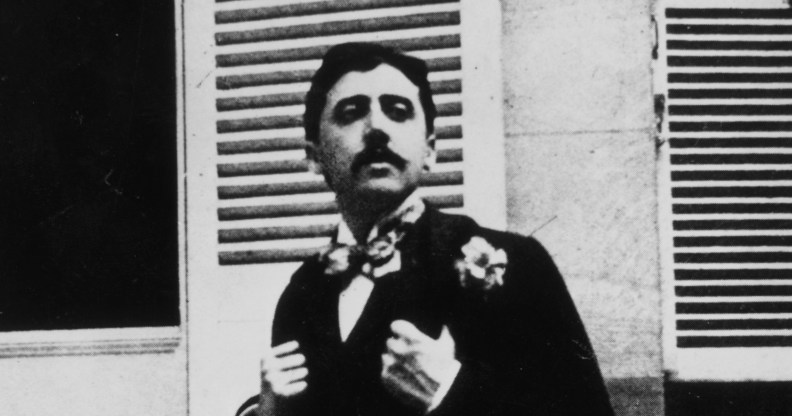Marcel Proust’s secret gay stories will finally be published

French author Marcel Proust sitting outside a window. (Hulton Archive/Getty)
Gay stories penned by Marcel Proust in the 1890s are set to finally be published.
The French novelist and poet, who was gay, penned a number of works featuring same-sex romances that never saw the light of day, likely due to the LGBT+ themes.
However, French publishing house Editions de Fallois plans to finally publish nine of his short stories in October, more than 120 years after they were written.
Marcel Proust stories to be published after 120 years
The collection of works will be published in French under the title The Mysterious Correspondent.
Reflecting on why the works were never released, Luc Fraisse of the University of Strasbourg explained: “There’s no doubt he considered [how the works would be received] in a society dominated by a prevailing strong traditional morality.
“Indeed, the dominant theme of these works is the analysis of ‘the physical love so unjustly decried’ in terms that reflect the story of Sodom and Gomorrah.”

Portrait of the French novelist Marcel Proust. (Mondadori via Getty)
The announcement also speculates that Proust could have used the stories as a form of diary “under the veil of a transparent fiction,” noting it reflects his own early perspective on sexuality.
Fraisse adds: “Homosexuality is always experienced in an exclusively tragic way, as a curse. We don’t find, anywhere, those comic notes… which give the work all the colours of life, even in the darkest dramas.”
The works were rediscovered in the 1950s alongside other unfinished novels penned by Proust, but were never published.
The Mysterious Correspondent will be published on October 9.
Marcel Proust’s love letters surfaced
Intimate letters from Proust to his male lovers were sold at auction in 2016.
The contents of the letters were censored by Proust’s descendants for more than 100 years, with content alluding to same-sex romances edited out of extracts of earlier published works.
In one letter to pianist Reynaldo Hahn, Proust lauded him as “the person who, besides mummy, I love most of all in the world.”
He added: “I want you to be here all the time but as a god in disguise, whom no mortal would recognise.”

Marcel Proust (seated), Robert de Flers (left), and Lucien Daudet (right)
The lot also included the only surviving copy of a 1896 photograph of Proust with lovers Lucien Daudet and Robert de Flers.
Proust’s mother had reportedly insisted that all copies of the photograph be destroyed due to its “suggestive” nature.

